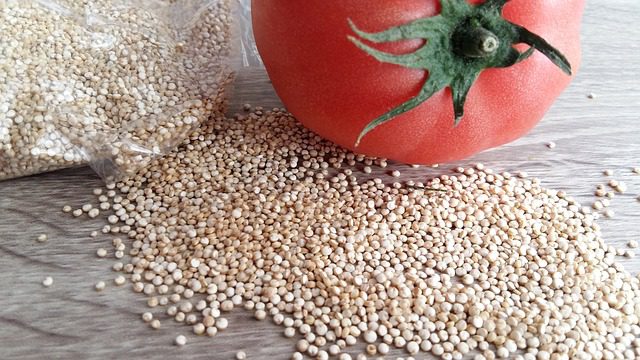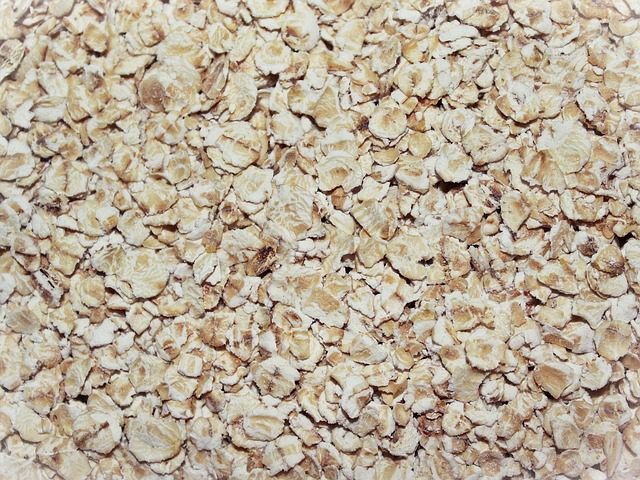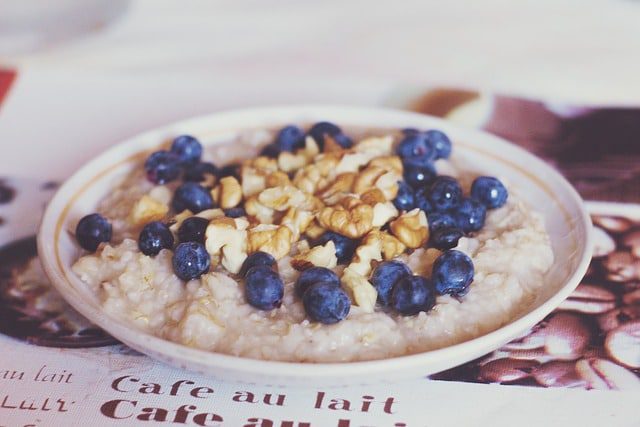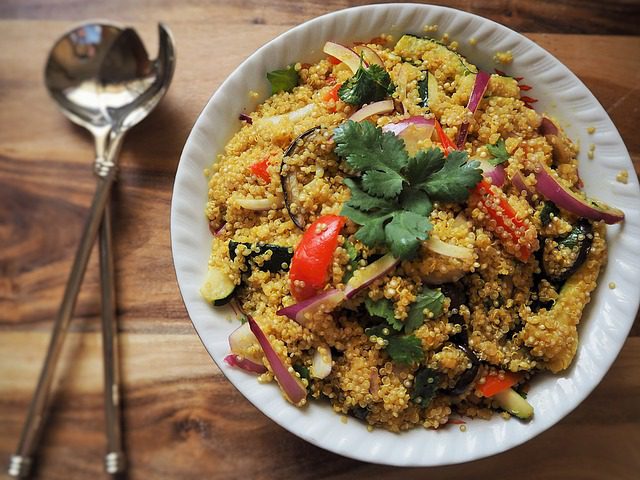People are becoming health conscious day by day. The need for maintaining a healthy diet is realized by all of us now, and we are incorporating more nutritious foods into our regular diet plan. Many foods can enhance our fitness and keep us away from several diseases. Quinoa VS Oatmeal is one of the most discussed topics these days. Both of them make a great breakfast dish that can boost our energy and keep us full for a long time. But selecting any one of them can be difficult for us. We must consider various factors and their health benefits to resolve the Quinoa VS Oatmeal conflict.
Table of Contents
What is Quinoa?
Kwality RCB Muesli Crunchy 400g | 76% Multi Grains with Almonds, Raisins & Honey | Natural Source of Vitamin & Iron | High in Protein & Fiber | Low Fat & Cholesterol-Free | Healthy Food & Breakfast Cereal | Endorsed by Royal Challengers Bangalore (RCB)
₹188.00 (as of March 18, 2025 14:21 GMT +05:30 - More infoProduct prices and availability are accurate as of the date/time indicated and are subject to change. Any price and availability information displayed on [relevant Amazon Site(s), as applicable] at the time of purchase will apply to the purchase of this product.)Quinoa is a seed from the Chenopodium quinoa plant. So, it is not a grain like oatmeal or barley. It is high in protein, gluten-free, and contains all of the nine essential amino acids.
What are the health benefits of Quinoa Flakes?
Quinoa has numerous health benefits which makes it a great breakfast food. Some of the benefits are mentioned below:
#1 Highly nutritious
185 grams of Quinoa contains:
- 8 grams of Protein
- 5 grams of Fiber
- 58% of Manganese
- 222 Calories
- 39 grams of Carbohydrate
- 4 grams of Healthy Fat (Omega-3 and Fatty Acid)
- 13% of Zinc
- 15% of Iron
- 18% of Copper
So, it is highly nutritious and favorite food for health-conscious people.
#2 Flavonoids
Quinoa flakes contain two major Flavonoids that are quercetin and kaempferol. They are anti-viral, anti-inflammatory, anti-depressant, and anti-cancer particles. They also have antioxidants and numerous health benefits.
#3 High in fiber
It has a higher level of fiber than most of the other grains. Most of its fiber is insoluble, still, it has a decent amount of soluble fiber. They help to reduce blood pressure, cholesterol, and body weight.
#4 Gluten-free
As quinoa is a seed, it is naturally gluten-free. Research shows that more people are opting for a gluten-free diet these days. But artificial gluten-free grains are not good for our health. So, quinoa is an excellent option for people who have a gluten allergy.
Related Reading:

#5 Protein
Protein is solely made of different amino acids. Nine amino acids are essential, among others. Our bodies cannot produce these amino acids, so we have to consume them through our diet. Most of the plants do not have all the essential acids. But, Quinoa contains all the nine amino acids which make it a complete protein diet. It is an excellent diet, mainly for all the vegetarian and vegans.
Also Read: Cooking Quinoa In A Cooker| Tips And Recipes
#6 Low Glycemic index
Food that has a high Glycemic index can accelerate your hunger and cause obesity. The Glycemic range of Quinoa is 53, which is quite low. So, it helps to control blood sugar.
#7 High in minerals
Many foods lack essential minerals like magnesium, zinc, potassium, and iron. Quinoa contains all these minerals that are very beneficial for our health.
#8 Good for metabolism
Quinoa helps accelerate the metabolic rate in our bodies. With all its nutrient content, it reduces insulin, sugar, and triglyceride levels in our blood.
#9 Antioxidants
It has a high rate of antioxidants that help us to fight aging and different diseases.
#10 Best for weight loss
Quinoa is rich in protein and fiber, which increases the metabolism rate and also decreases our appetite, so we feel full and consume less food which is best for weight loss.
What is Oatmeal?
Oat is a type of cereal grain that is grown in its seed. We can consume oat as oat milk and oatmeal. Oatmeal is made from steel-cut, milled, or rolled oat grains.
What is Oats made of?
Oatmeal contains nutrients that keep the body healthy. They contain:
- Thiamin
- Riboflavin
- Niacin
- Carbohydrate
- Protein
- Healthy fat
- Sodium
- Fiber
- Calcium
- Vitamin B6
- Folic Acid
- Vitamin E
- Potassium
- Iron
- Magnesium
- Phosphorus
- Zinc
- Selenium
- Copper

Is Oatmeal a complete protein?
The composition of oatmeal is very balanced. It has 66% carbohydrates, 17% protein, 11% fiber, and 7% fat. Though it does not have all the nine essential amino acids, it contains a higher quality of protein quality than any other grain-based food. 12% to 18% of oats weight consists of protein, which is quite higher than other popular grains. So, oatmeal is suggested to all as a complete protein diet.
What are the health benefits of Oatmeal?
Oats contain a well-balanced nutrient composition. Some of its health benefits are mentioned below:
#1 Rich nutrition
Oats are loaded with vitamins, antioxidants, and minerals. 78 grams of oat contains:
- 191% of Manganese
- 34% of Magnesium
- 20% of Zinc and Iron
- 24% of Copper
- 41% of Phosphorus
- 51 grams of Carbohydrate
- 13 grams of Protein
- 8 grams of Fiber
- 303 Calories
- 5 grams of Healthy Fat
All these components make Oatmeal the most nutrient-dense food that one can have.
#2 Rich Antioxidants
They are rich in antioxidants, which are called Avenanthramides. This group of antioxidants can only be found in Oats. It produces nitric oxide and helps to reduce the blood pressure level.
#3 Beta-glucan
A high amount of beta-glucan is found in oatmeal. It is a type of soluble fiber that reduces the total cholesterol level, sugar level, and insulin response. Beta-glucan also increases the growth of useful antibodies that help us to fight diseases.
#4 Blood-cholesterol
A high level of cholesterol leads to severe heart diseases. Oats help lower the risk of our heart diseases by diminishing the LDL cholesterol and total cholesterol in our blood. Thus, it protects LDL cholesterols from oxidation.
#5 Blood sugar
Oats improve the blood sugar level and insulin sensitivity. Mainly for over-weight people, oats can be beneficial. It prevents diabetes by controlling the elevation of sugar level in our blood.
Also Read: Types Of Oats: Steel Cut and Rolled Oats| What’s The Difference?

#6 Helps in weight loss
Oatmeal gives us a feeling of fullness for a long time. The beta-glucan in oatmeal helps us to intake fewer calories daily, and thus helping us in weight loss.
#7 Skincare
Colloidal oatmeal has been used to treat dry skin and itchiness for a long time now. It helps to cure many skin conditions like eczema. That is why oats can be found in many skincare products.
#8 Childhood asthma
Oats protect a child from childhood asthma. Researches show that feeding oats to kids have significantly decreased their risk of childhood asthma.
#9 Constipation
Older people often suffer from constipation. Consuming oatmeal as breakfast can reduce the constipation rate in them.
Thus, Oatmeal is a great food packed with fiber, nutrition, and minerals. They have many unique components that can be exceptionally beneficial for our health. Read more benefits here.
Quinoa VS Oatmeal: Can Quinoa be one of the alternatives to Oatmeal
Depending on its numerous health benefits, Quinoa can surely be one of the options for Oatmeal. These days people prefer Quinoa over Oatmeal due to its Gluten-free nature. Instead of buying organic whole grains, Quinoa is cheaper and more natural. It has no health risks, as well. As breakfast, we have Oatmeal for ages. But people are now finding new ways of adding Quinoa to their diet. We can cook Quinoa like Oatmeal, or we can add some flavors to it. Quinoa and Oatmeal both make a healthy breakfast, no matter whichever we choose.
Also Read: How To Eat Oats: 7 Best Ways To Eat Oats

Quinoa VS Oatmeal: Is Quinoa better than Oatmeal?
Many of us face difficulties when we have to select anyone for our breakfast. Both of them are highly nutritious and healthy food.
Quinoa VS Oatmeal: Health benefits
The comparative details on the health benefits of each.
#1 Fat
Oatmeal contains more fat elements than Quinoa. But these are ‘good fats’ that our bodies require. Fats like omega-3 and omega-6 are very healthy.
#2 Fiber
Oatmeal is mostly made of soluble fiber. It helps to reduce the cholesterol level and prevent blood sugar. Quinoa has insoluble fiber which is excellent for diabetic patients.
#3 Protein
Oatmeal has more protein than Quinoa. Still, Quinoa is considered to be a complete protein diet as it consists of all the healthy amino acids and lysine.
#4 Carbohydrates
Though Oatmeal contains a considerable amount of carbohydrates compared to Quinoa, it is still suggested as a regular breakfast. These carbohydrates will not make us fat. They are beneficial for one’s health and give an instant energy boost.
#5 Gluten
Gluten can be found in all types of grains. Because Quinoa is a seed, it is gluten-free. Though Oatmeal is also gluten-free, it contains avenin, which has the same characteristics as gluten. So, people who are allergic to gluten should go for Quinoa.
#6 Glycemic Index
Diabetic patients must avoid foods that contain a high glycemic index. Both Oatmeal and Quinoa have a low glycemic index. The glycemic index ranges from 50 to 80 for Oatmeal and 40 to 53 for Quinoa.
#7 Weight Loss
Both of them help with our weight loss. Oatmeal contains fiber that keeps one full for a longer time. Quinoa helps the body to absorb lesser calories and fat.
#8 Cholesterol
Both of them help the body to maintain the cholesterol level. Quinoa also prevents heart diseases.
#9 Beta Glucan
Beta-glucan is a type of carbohydrate that can be found in Oatmeal. It helps children to fight asthma. Beta-glucan also enhances one’s immune system and fights foreign germs. Oats are also good for our digestion.
#10 Taste
According to taste, we are much familiar with Oatmeal as we have been having them as our breakfast since our childhood. We usually boil them until they are soft and then mix them with milk and add fruits as toppings. In the case of Quinoa, we are still not habituated with its taste. They can also be made in various ways and served as a healthy breakfast.
Final Words
Now, coming back to the main question about Quinoa VS Oatmeal conflict and if Quinoa is better than Oats, we can say that one is not better than the other. It depends on an individual and their preferences. Some love Oatmeal because of its traditional ancient flavor, and some prefer Quinoa because of its subtle gluten-free taste.
The Quinoa VS Oatmeal dilemma has become a much-discussed topic. That is why now we have Quinoa Oatmeal mixed breakfast. This way we can have the best of both Oatmeal and Quinoa nutrition. This is an excellent option for our breakfast that can keep us healthy, energetic, and fit throughout the day, and also answers your question ‘Quinoa VS Oatmeal’.
Frequently Asked Questions
Here are a few interesting FAQs we answered about oatmeal and quinoa.
#1 Which is healthier: quinoa or oatmeal?
Both are highly nutritious and healthy food. They are low in glycemic index. Both of them help with weight loss.
Oatmeal contains more good fats, such as Omega-3 and Omega 6. It is made of soluble fiber. In addition, it contains a good amount of carbs for an instant energy boost.
Quinoa consists of healthy amino acids and lysine. It has insoluble fiber, which is best for diabetic patients. In addition, it is gluten-free, an excellent choice for gluten allergic people.
#2 Is quinoa a good substitute for oatmeal?
Depending on its numerous health benefits, Quinoa can surely be one of the options for oatmeal. These days people prefer quinoa over oatmeal due to its Gluten-free nature. Instead of buying organic whole grains, Quinoa is cheaper and more natural. It has no health risks, as well.
#3 Is it OK to eat quinoa every day?
Quinoa is low in calories and high in protein and fiber. Eating quinoa and whole grains may benefit our overall system. It could reduce the risk of cardiovascular disease, respiratory issues, diabetes, and chronic illness.
#4 Is Quinoa good to eat for breakfast?
Many of us face difficulties when we have to select what to eat for our breakfast. Both quinoa and oatmeal are highly nutritious and healthy foods.
Quinoa is high in protein and fiber. Though Oatmeal contains a considerable amount of carbohydrates compared to Quinoa, it is still suggested as a regular breakfast for active people. These carbohydrates will not make us fat. Instead, they are beneficial for one’s health and give an instant energy boost.
#5 Which has more fiber: quinoa or oatmeal?
Quinoa has a higher level of fiber than most of the other grains. Most of its fiber is insoluble, still, it has a decent amount of soluble fiber. They help to reduce blood pressure, cholesterol, and body weight. It is excellent for diabetic patients.
Oatmeal is mainly made of soluble fiber. It helps to reduce cholesterol levels and prevent blood sugar.




